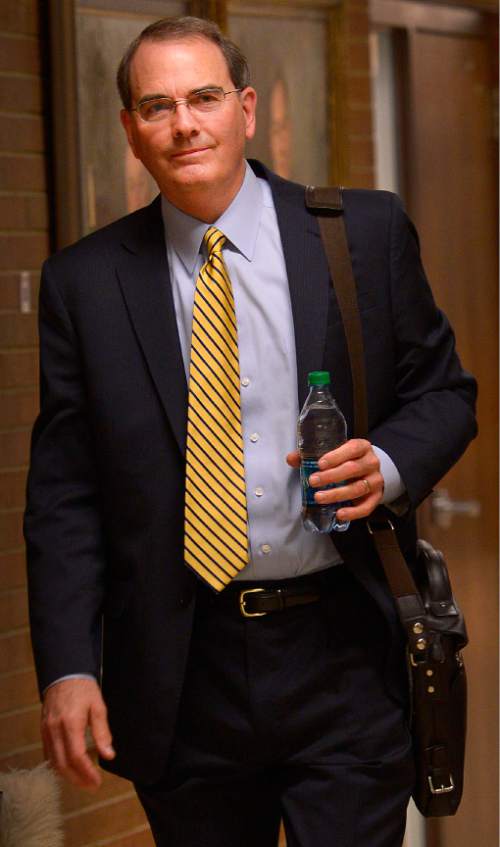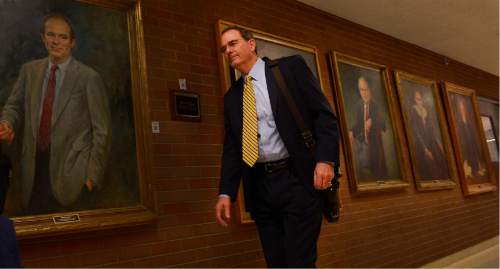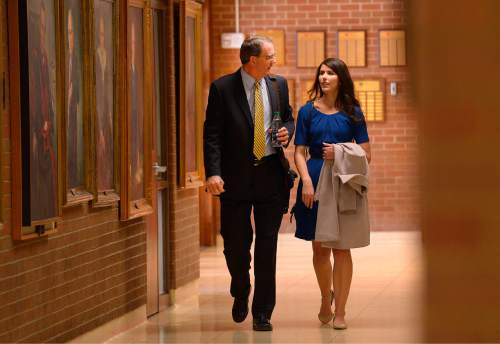This is an archived article that was published on sltrib.com in 2015, and information in the article may be outdated. It is provided only for personal research purposes and may not be reprinted.
The man who signed two memorandums clearing the CIA to torture terror suspects told University of Utah students Thursday there are constraints on presidential power.
Judge Jay Bybee also said he is no fan of the death penalty and insisted Nevada rancher Cliven Bundy is not free to interpret the Constitution all by himself.
Bybee, a judge on the 9th U.S. Circuit Court of Appeals, spoke at the law school at the invitation of the S.J. Quinney Chapter of the Federalist Society. The title of his speech was "A Constitution We Are Confounding." Bybee encouraged the budding barristers to think about what the Constitution says, and not just what the courts say it says.
After speaking for about 35 minutes on the history of the Constitution and the need for all three branches of government to interpret it, Bybee took questions. The audience included at least a few people who were not law students, and they tried to ask him questions related to his time as an attorney in the U.S. Department of Justice during the George W. Bush administration and about two memorandums he signed concerning torture.
One middle-aged man stood to the side of the classroom with a sign reading "Torture Is a War Crime." A woman of a similar age next to him tried to ask Bybee about executive branch power and "the secret torture of Muslims." The moderator from the Federalist Society cut her off before she finished the question.
"That question is way beyond my ability to predict," Bybee then replied.
Also in the audience was retired Brig. Gen. David Irvine, who earlier in the week published an opinion column in The Salt Lake Tribune criticizing Bybee and his views of the Constitution.
Irvine asked Bybee if there were constraints on a president's powers as commander in chief.
"Yes," Bybee replied, "the commander in chief remains bound by international conventions. The commander in chief is bound by treaties."
Bybee then said there is a question of whether Congress can create mechanisms to "second guess the president" when he believes his powers are constrained.
After the question-and-answer period, Irvine approached Bybee and tried to ask more about the memos.
Bybee pointed to a section in one memo telling the CIA that if the facts change, to notify the Justice Department for an updated opinion. Bybee also invited Irvine to his offices in Las Vegas to discuss the issue further.
Irvine said he would visit Bybee the next time he is in Las Vegas.
Irvine said moments later that the speech didn't make him feel better about the memos, though he found it interesting when Bybee described the constrictions on presidential power.
"That is not what I read in that [2002] memo," Irvine said.
Bybee, a Brigham Young University graduate, was the assistant U.S. attorney general for the Office of Legal Counsel when he wrote two memos dated Aug. 1, 2002. One memo stated that none of the interrogation methods the CIA planned to use would cause "severe pain," as outlawed in U.S. statutes making it a crime to torture.
Bybee wrote a second memo that day saying that even if interrogators technically violated the statutes, they could argue the actions were necessary to defend the country. Bybee also said that charging an interrogator with a crime under the torture statute would be unconstitutional because it would violate the president's powers as commander in chief.
Both memos then were cited as justification to use the enhanced techniques on other CIA detainees.
A U.S. Senate report released last year detailed how the CIA misled Bybee and the Justice Department about the severity of the interrogation techniques, the relationships between the suspects and al-Qaida and the success they were having eliciting information with the techniques. The report found no evidence that what the CIA called "enhanced interrogation" techniques stopped any terrorist attacks.
Irvine and other critics, however, have said even if the facts were true, Bybee's legal reasonings were flawed for how they ignored U.S. law and international conventions on torture.
A visit from a federal appeals court judge is a big day at a law school, and the 100-person classroom was full for Bybee. Law students ate free pizza and drank free soda while Bybee talked.
One student pointed out that Bundy, the Nevada rancher who has refused to pay grazing fees, carries a copy of the Constitution, and asked Bybee whether anyone owes deference to Bundy's interpretation.
"Well, we can't all read the law for ourselves" and decide what it means, Bybee replied. He then suggested that Bundy's interpretations were not superior to the federal judge who has ordered him to pay the fees.
"I'm happy he's a fan of the Constitution," Bybee said of Bundy. "I'm glad he's reading it. But at some point those orders have to kick in."
Bybee also raised a question about how to balance the Constitution permitting the death penalty with restrictions on cruel and unusual punishment, due process and equal protections.
"The death penalty can go away in my circuit and nobody would be happier than me," Bybee said. "I'm not a fan, particularly of the way it's administered."
The moderator, law student Samantha Smith, ended the discussion with a compliment to Bybee.
"This is a big victory for the law school," she said, "to have someone this prestigious come here."
As he was leaving the law school, Bybee said he has had protesters at events before.
"I don't get them always, but I get them occasionally."
Twitter: @natecarlisle







